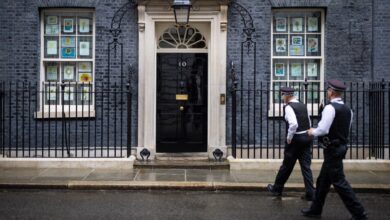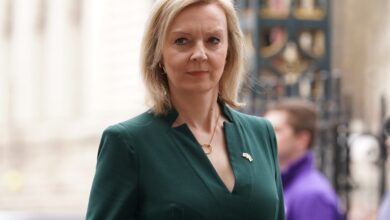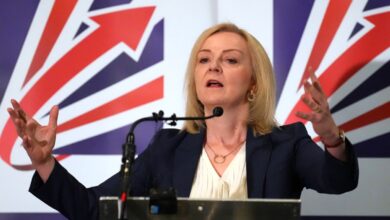Liz Truss’s rejection of windfall tax ‘to saddle UK with debt for decades’

Sterling plunged to its lowest level against the dollar in 37 years as experts warned Liz Truss’s plan to ease the cost of living crisis without taxing energy firms could saddle Britons with debt for decades.
Markets appeared to be rattled by the new prime minister’s decision to borrow to pay the £100bn-plus needed to keep lights and heating on this winter.
Low-pay think tank the Resolution Foundation warned the eventual cost of the energy crisis could even outstrip the £137bn bailout of banks following the 2008 financial crash.
The PM’s plan, which she will unveil in a statement to the Commons on Thursday, will freeze average bills at a level of around £2,500 by setting a cap on the price of a unit of energy, with anything above paid by the government.
Ministers have rejected an industry proposal for the state to underwrite bank loans to energy suppliers to cover the gap between the cap and the sky-high market price.
But Ms Truss came under intense fire at Prime Minister’s Questions when she flatly rejected the alternative of extending the £5bn windfall tax imposed by Rishi Sunak earlier this year.
Labour accused Ms Truss of making working people foot the bill while allowing energy firms to keep reaping huge profits during the cost of living crisis.
“Every single pound in excess profits she chooses not to tax is an extra pound on borrowing that working people will be forced to pay back for decades to come,” said Sir Keir Starmer. “Families and public services need every penny they can get. How on earth does she think now is the right time to protect Shell’s profits?”
The SNP’s Westminster leader Ian Blackford branded the plan a “Truss tax” amounting to “a decade-long raid on the bank accounts of ordinary taxpayers”.
As sterling slid to a 37-year-low just above $1.14, new chancellor Kwasi Kwarteng met with City financiers and Bank of England governor Andrew Bailey to reassure them about the government’s economic strategy.
Despite the need to take “decisive” action which will mean “necessary higher borrowing in the short term”, the Treasury is committed to ensuring that GDP grows faster than debt, and keeping debt as a proportion of the economy on a downward path, he said.
After Ms Truss spooked the City during the Tory leadership campaign by raising questions about the remit of the Bank of England, Mr Kwarteng gave his “full support” for its independence and its mission to control inflation. He reiterated his aim to get to 2.5 per cent trend growth – far above the current 0.8 per cent.
Speaking to The Independent, anti-poverty campaigners raised concerns that the cost of repaying the massive borrowing will eat into funds available for public services like health, education and care over many years.
Rebecca McDonald, chief economist at the Joseph Rowntree Foundation, said it was right for Ms Truss to “act boldly to tackle energy prices, and do so immediately”.
But she added: “While it is necessary to spend on a scale that meets the challenge of the emergency we face, the way it is clawed back in future is also important.
“We must avoid doing so in a way which places the burden on families on low incomes or which undermines the public services we all rely on. Families on lower incomes need support now and assurances it will be adaptable to the ongoing crisis, not to worry they will be responsible for picking up the bill.”
Simon Francis, of the End Fuel Poverty Coalition, warned there must be special provision for 7 million people with exceptionally high bills – including disabled people needing to run medical equipment on a 24-hour basis, and pensioners in old and poorly insulated homes – who risk “falling through the net” of Ms Truss’s plans.
Speaking ahead of Thursday’s announcement, Ms Truss said she would “take action immediately to help people and businesses with bills but also take decisive action to tackle the root cause of these problems”.
“I know families and businesses across the country are worried about how they are going to make ends meet this autumn and winter,” said the prime minister, who had previously denounced “handouts” to help pay bills.
At PMQs Labour leader Keir Starmer asked why the profits of energy firms were off the table





